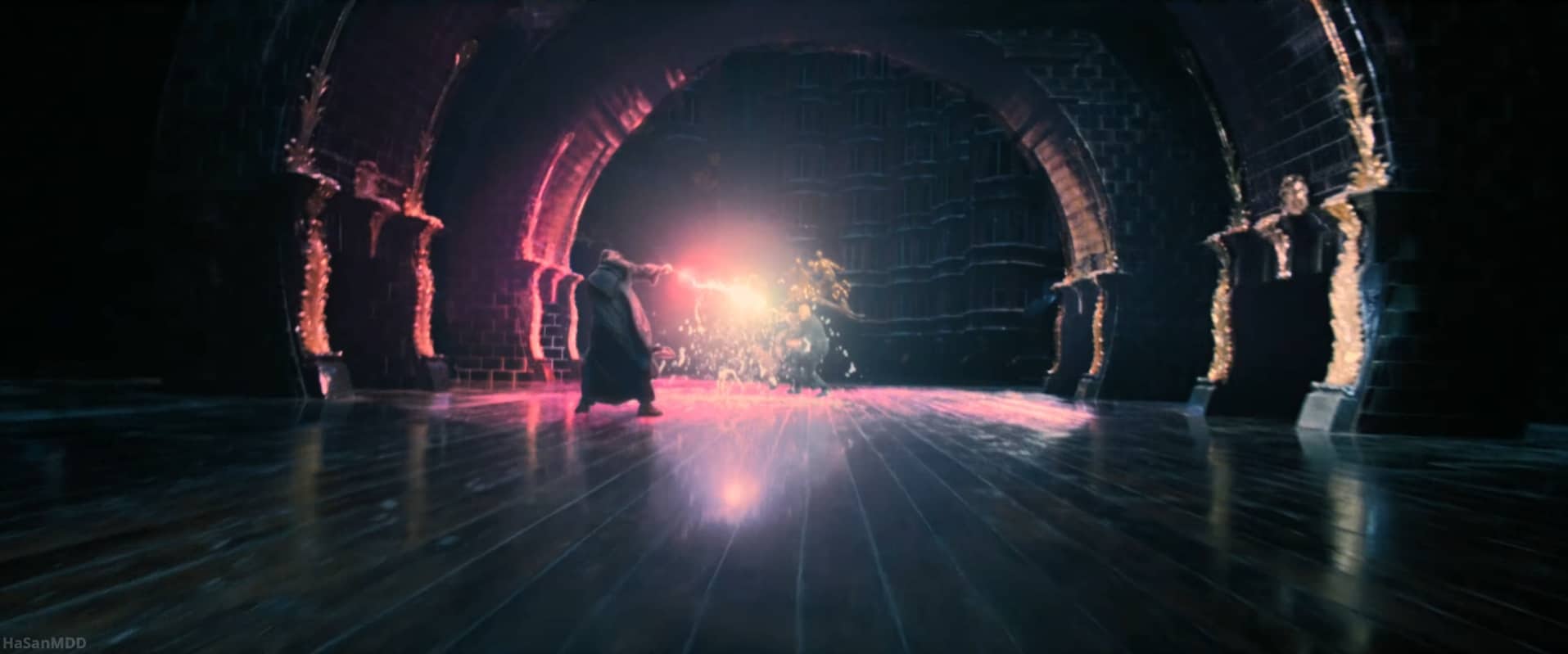How to Run a Wizard’s Duel in D&D 5e
Published on October 13, 2020, Last modified on September 15th, 2021
In this article, we break down our homebrew solution to everybody’s favorite spellcaster showdowns.

Table of Contents
Why use these rules?
These rules have been created to turn typical turn-based combat into a fast-paced, spell-slinging duel that relies on wit and creativity to succeed.
The inspiration for this ruleset is certainly Dumbledore vs Voldemort in the Ministry of Magic in Harry Potter and the Order of the Phoenix. If you aren’t familiar with this scene, definitely check out the video linked.
These rules also prevent the duel from ending in a single turn because of a mind effect spell like Command, or a huge damage spell like Disintegrate.
Before Dueling
Most Wizards fight by a sense of honor and, when a duel is called, they have to abide by a set of rules:
- The fight is between two Wizards, no outside help
- Spells only, no weapon or unarmed attacks (melee spell attacks are fine)
- Magical items, Conjure X spells, and familiars can only be used if agreed upon beforehand
- Preexisting effects from spells, potions, etc. that have been cast should be canceled, if possible
The Duel
The duel starts with the rolling of Initiative. Whoever rolls highest will be “Attacking” first. Whoever rolls lowest will be “Defending” first.
Attacking
When Attacking, creatures have the typical Action, Bonus Action, and Movement phases of their turn. If an offensive spell is cast, the Defending Wizard has an opportunity to somehow foil the attack or the spell will resolve normally. This “Defending Action” takes place before an attack roll or saving throw is made.
Defending
When the Attacking Wizard casts a spell, the spell is described in a physical sense (i.e a cone of fire shoots out of their hands towards you). The Defending Wizard can then use their Reaction and Defending Action.
The Reaction can be used to cast a spell (like casting Shield or Counterspell) or it can be used to identify the spell that has been cast. To identify a spell, the Wizard must succeed on an Arcana check that is 15 + the spell’s level. If the spell is cast as a class spell and the character is a member of that class, the check is made with advantage. On a success, the Defending Wizard learns the name, effect, and level of the spell cast.
The Defending Wizard can then use their “Defending Action”, to cast a single spell. If a reaction was used this turn, the spell can only be a Bonus Action or Reaction. Otherwise, any spell can be cast.
Resolving a Spell
When both spells have been cast, the level at which each spell was cast is revealed. In-person, this can be done easily with the DM and player both revealing a d10 that is face-up on the spell’s level. Online, you could use a chat function.
The spells resolve in an Arcana Check, depending on the difference in the spell’s levels. Whoever cast the higher-level spell gets the bonus listed in the “+ To Arcana Check” column:
| Difference in Spell Levels | + To Arcana Check |
| 1 | 1 |
| 2 | 2 |
| 3 | 3 |
| 4 | 5 |
| 5 | 7 |
| 6 | 9 |
| 7 | 13 |
| 8 | 15 |
If the spells interact with one another in a specific way, such as casting a water spell against a fire spell, the DM can provide Advantage or Disadvantage to the Arcana check as needed.
Doing Damage / Resolving Saving Throws
Melee/Ranged Spell Attacks
Once the Arcana checks have been resolved, have the attacker make the necessary spell attack roll. On hit, the spell’s damage is modified using the following table:
| Arcana Check Difference | Damage |
| Defender > Attacker | Spell Fails |
| Attacker = Defender | ½ Damage |
| Attacker +5 > Defender | ⅔ Damage |
| Attacker +10 > Defender | ¾ Damage |
| Attacker +15> Defender | Full Damage |
Saving Throw
Based on the difference in Arcana checks, the spell’s DC is modified using the following table:
| Arcana Check Difference | Damage |
| Defender > Attacker | Spell Fails |
| Attacker = Defender | ½ DC |
| Attacker +5 > Defender | ⅔ DC |
| Attacker +10 > Defender | ¾ DC |
| Attacker +15> Defender | Full DC |
DC and Damage are always rounded down to a minimum of 1.
Ending a Duel
The duel ends when one Wizard voluntarily yields, is knocked unconscious, is killed, or runs out of spell slots.
Other Rules
- Each spell in your repertoire can only be cast once. When all spells have been used, a spell can be cast again. If a spell is not useful in combat (i.e Magic Mouth) it can be skipped.
- Cantrips count as a level 0 spell when resolving spells and do not count as spells in your repertoire.
Adapting these rules for different scenarios
This ruleset has been built around two Wizards that have similar spellcaster levels. There are definitely ways to adapt these rules for spellcasters in different classes or different levels. The following are suggestions to frequently asked questions:
What if I have 2 different spellcaster classes facing off?
To even the playing ground, all Arcana checks can be switched to Spellcasting Ability checks.
What if I have 1 higher-level caster facing off against a lower level caster?
Adding a second lower level caster to make it 2v1 can help even the playing field.

I like the idea of running duels in 5th edition, and I think your layout of the action economy makes a lot of sense. I do have a question: In the case that Shield, 1st level abjuration, is cast as a reaction in response to a Magic Missile, which can be cast at any level 3 or higher, how does the spell get resolved?
The dueling rules would say that if the attacker wins the arcana check, damage will be dealt. But Shield specifically mentions Magic Missile and that the target of a Shield cannot take damage from Magic Missile. Also, Shield cannot be cast at higher levels, meaning that in this situation the attacker will always get a bonus of at least +2 to their arcana check, even though the mechanics of 5e intends that Shield beats Magic Missile.
So does the duel require the Shield to win an arcana check to beat the Magic Missile?
Additionally, how does armor class factor in? AC is intentionally used in 5e against spell attack rolls. So spells like Shield and Mage Armor, which increase the target’s AC, are intended to help protect a spellcaster from weapon attacks AND spell attacks. I would be curious how to fit in the AC stat into the melee/ranged spell attack arcana check table.
Thanks for reading Bec! I would say that the Shield vs Magic Missle interaction would go the way the PHB describes. 5e has a rule that “specificity beats generalization” so, seeing as Shield specifically says it blocks the MM damage, that effect would resolve.
As for AC, I have adjusted the section under “Melee/Ranged Spell Attacks” to mention that a spell attack vs AC would still need to be made.